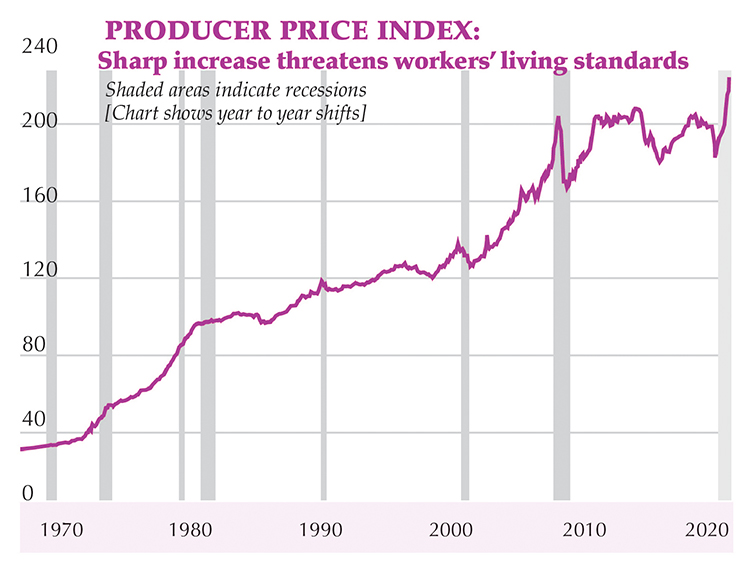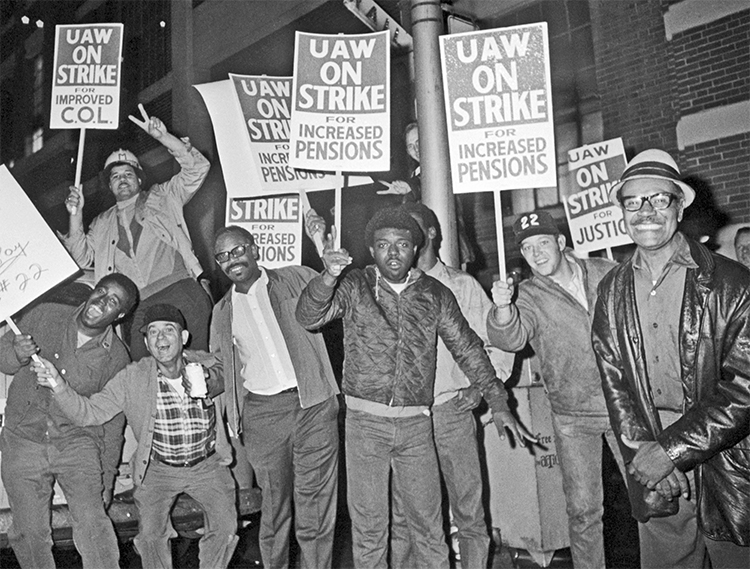Price hikes on basic necessities are wreaking havoc on working people at the same time millions remain out of work. Workers and our unions need to join together to fight for cost-of-living clauses in every contract, and in key government programs like Social Security, so our wages go up every time prices rise and we can defend our standard of living.
The annual consumer price index surged to 5% in May. Food and other groceries, furniture, clothing and used cars all jumped in price. Getting to and from work is more expensive as gas prices have jumped nearly 50% in the past year. They’ve gone up even more for the last seven weeks.
More price rises are on the horizon, as manufacturers and other bosses report their costs of production hit a record high in May. This includes hikes in raw materials and transportation. Steel, glass, plastic, paper and leather all went up. Sea shipping rates from Asia have quadrupled for many goods.

Food is going up. Hormel Foods announced price hikes on ground turkey, peanut butter and Spam. Retired workers are hit especially hard. Blind to these conditions, President Joseph Biden and the Federal Reserve both claim there is nothing to worry about, saying the rise in inflation is just a blip.
For some capitalists the price increases are a bonanza. Inflation at the high end of the housing market is providing a boon for property speculators. Two condos on New York City’s Billionaires’ Row were bundled and sold together for $157.5 million this month, one of the most expensive residential transactions of all time in the city.
Like the owners of other food delivery companies, bosses at DoorDash call their workers “independent contractors,” shutting them out of benefits, the minimum wage, overtime pay and paid sick leave, at a time the bosses’ profits are soaring. CEO Tony Xu was compensated $414 million for the last year.
Workers fight for escalator clauses
Workers need to organize and use our unions to fight against the ravages of inflation, including for a sliding scale of hours and wages. There are valuable lessons from past labor struggles when our class fought for and won automatic cost-of-living-adjustments, also known as escalator clauses, in contracts to protect our wages from being stripped of their buying power.
The first escalator clauses were won by workers in major industries in the 1940s, building on the explosive wave of labor battles that built the CIO before the second imperialist world war. During the 1945-46 postwar strike wave, workers sought to claw back some of what bosses had taken from them during the war. The Franklin D. Roosevelt government had imposed a wartime wage freeze, which was supported by most labor officials who backed Washington’s war aims. This freeze supposedly included a freeze on prices, but the bosses forced price increases through and workers’ living costs jumped 30%!
Workers at General Motors demanded an escalator clause in their contract in 1948. The bosses gave in just 72 hours before workers were due to strike. Two years earlier some 225,000 United Auto Workers members at GM had struck for 113 days to win substantial pay hikes, paid vacation and other gains. “During the 12-year inflationary period from 1948 to 1960, the GM escalator clause brought regular automatic wage increases,” writes Art Preis in Labor’s Giant Step, The First Twenty Years of the CIO: 1936-55, an invaluable book on working-class history.
As profit rates began falling in the 1970s, the employers launched an offensive against working people. Escalator clauses were a special target of their assaults.
In 1976 some 6 million workers had cost-of-living adjustment clauses in their contracts, but by 1995 that figure had been driven down to 1.2 million. Not only did real wages decline from the early ’70s onwards, but bosses sought outright hourly wage cuts. All too often, our union officials refused to organize workers to use our union power to fight these assaults and mobilize widespread solidarity. Today COLA clauses are largely limited to workers in some public sector jobs.
We need to put escalator clauses with teeth back on labor’s banner!
Price committees
Bosses and their media peddle the myth that when workers fight and win higher wages, it means higher prices. But that isn’t true. It’s part of the fight of our class to wrench more of the fruit of what our labor produces away from the boss class, which produces nothing. If they try and respond by jacking up prices, this can be fought.
In the 1970s, skyrocketing inflation led to public protests, many led by housewives. These protests won widespread working-class support and helped push back some price increases. “Workers can defend ourselves from the twin scourges of unemployment and inflation by coming together and using our unions to fight against the bosses,” Joanne Kuniansky, Socialist Workers Party candidate for New Jersey governor, told the Militant.
“We need to fight for a sliding scale of hours — 30 hours work for 40 hours pay — to share the available work around and get millions back to work, with no cut in pay. And fight for a sliding scale of pay, escalator clauses, that guarantee when prices go up our wages automatically match the increase.”
One of the anti-working-class moves by the administration of Democratic President Bill Clinton was to grant a profit bonanza to the bosses by rejiggering the Consumer Price Index in a way that substantially reduced official price figures. That’s one of the key reasons that when prices go up, our pensions and Social Security don’t go up the same amount!
“Every administration — Democratic and Republican alike — acts to defend the bosses’ interests and tries to divide and weaken the workers’ movement,” Kuniansky said. “Workers need to fight for committees on prices made up of our trade unions, farmers, housewives and other consumers. Price committees would force open the bosses’ books, expose their price gouging, reveal the true extent of inflation and demand control over the fixing of prices. Workers would learn we are capable of running society ourselves in the interests of all those exploited and oppressed by capital.
“Working people are transformed in struggle,” Kuniansky said. “We will organize in our millions to build our own party, a labor party, to fight to unseat the ruling capitalist families and take political power into our own hands.”


